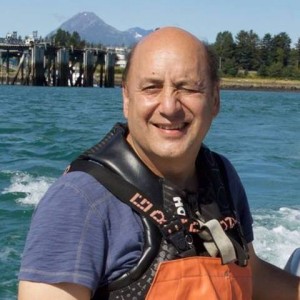
A longtime critic of Sealaska management is campaigning to limit the terms of the regional Native corporation’s board of directors. Previous efforts have failed.
Sealaska allows its 13 board members to serve as long as they can win re-election. While some directors are relatively new, others have been on the corporation’s governing body for anywhere between 25 and 40 years.
Shareholder Michael Lee Beasley, also known as Mick, wants to change that. He’s filed a resolution limiting directors to just three complete three-year terms.
“If we want to restructure ourselves, we have to start with our election system,” Beasley said.
Beasley has done this before and lost. His last attempt, in 2012, tried to limit directors to four terms. And in 2009, he tried for just two terms.
The Juneau artist said incumbents have too much advantage, creating a largely self-perpetuating board.
“We need a fair and balanced election system, and that will usher in different directors, different ideas, different opportunities and it will be more inclusive,” Beasley said.
The term-limits resolution will be on Sealaska’s proxy ballot, which will be issued to shareholders this spring. Results will be released at the annual shareholders meeting June 25 in Ketchikan.
Jaeleen Araujo, who serves as corporate secretary, vice president and general counsel for the corporation, said the measure meets Sealaska’s basic requirements.
“Simply stated, he submitted a resolution that meets the qualifications because it’s not unlawful, it’s appropriate to come before the shareholders and he secured the signature of 1 percent of our voting shares in the corporation,” she said.
She said the board will not take a position on the resolution until its next regular meeting in early April. The board opposed the previous two attempts.
During the 2012 election, then-Corporate Secretary Nicole Hallingstad said such a measure would force many directors to leave.
“This is a really significant loss of institutional experience and knowledge. That actually damages the credibility and stability of the corporation,” she said.
The board makeup and leadership have changed somewhat since then.
Four board seats will also be on the 2016 ballot. Most years, a board slate of incumbents wins or takes the majority of open seats.
Beasley said he’ll file to run for the board, as he has done before. He said his candidacy will include promoting his term-limits measure.
“The idea here is you’re like a little mouse fighting against an elephant. But you’ve got to keep your squeak going, or there’s never going to be any change,” he said.
Sealaska officials maintain that the elections are fair and that the reason earlier term-limits measures have failed is that shareholders don’t want the change.
They’ve said the same about separate Beasley resolutions to change or eliminate discretionary voting, where shareholders turn their ballots over to the board.
The regional Native corporation for Southeast has close to 22,000 shareholders. About half live in Alaska, while about a third live in Washington, Oregon or California, according to the corporate newsletter.
Ed Schoenfeld is Regional News Director for CoastAlaska, a consortium of public radio stations in Ketchikan, Juneau, Sitka, Petersburg and Wrangell.
He primarily covers Southeast Alaska regional topics, including the state ferry system, transboundary mining, the Tongass National Forest and Native corporations and issues.
He has also worked as a manager, editor and reporter for the Juneau Empire newspaper and Juneau public radio station KTOO. He’s also reported for commercial station KINY in Juneau and public stations KPFA in Berkley, WYSO in Yellow Springs, Ohio, and WUHY in Philadelphia. He’s lived in Alaska since 1979 and is a contributor to Alaska Public Radio Network newscasts, the Northwest (Public Radio) News Network and National Native News. He is a board member of the Alaska Press Club. Originally from Cleveland, Ohio, he lives in Douglas.




